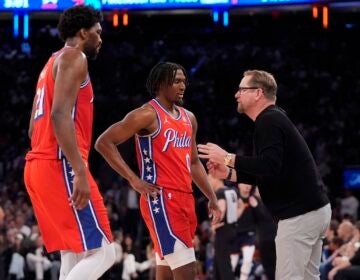Urban gardening efforts grow at city’s second largest homeless shelter
Volunteers from local businesses and non-profits got down and dirty this week to expand a small plot of land in Northwest Philadelphia that is doing a lot of good.
Staffers with Weavers Way Co-Op and the People Helping People Foundation led Wednesday’s effort at Hope Garden, a cultivated swatch in the shadow of Martin Luther King High School that supplies fresh vegetables to the neighboring Stenton Family Manor.
The Stenton Family Manor (SFM), the city’s second largest homeless shelter, provides temporary living quarters for families. The East Germantown-based non-profit serves as many as 160 children up to age 18 – as well as 230 meals, three times a day – and is the only shelter in the city to accept teenagers in the company of guardians.
Wednesday’s goal was to till an additional field for the garden and install 350 feet of fencing to enclose the expansion, the labor and materials for which was donated by VPS Landscaping of Doylestown.
Gardening grows the mind
Hope Garden was created in 2009, when Weavers Way Community Programs created a 1/3 acre plot to supply fresh food for residents of SFM and establish a farm education program. Since then, the garden – and its impact – has grown.
“We’re working toward changing the culture around eating healthy food,” said Rachel Milenbach, executive director of Weavers Way Community Programs.
Prior to the involvement of Weavers Way, which has storefront locations in Mount Airy and Chestnut Hill, Milenbach noted that residents’ meals would often be rounded out with canned goods. In 2008, Weavers Way began donating farm produce for use by kitchen staff at SFM. The following year, fresh produce from Hope Garden began to make its way inside.
“The people in the kitchen are now used to working with fresh vegetables,” said Milenbach.
In addition, Weavers Way supports outreach efforts targeted to younger residents of SFM.
Noting that gardening can aid in a child’s developmental process, Milenbach said that younger residents can experience the growing season firsthand, witnessing a process that begins with the spring planting and ends with the fall harvest.
“There’s an endless amount of learning – and ways of learning – about gardening for children,” she observed.
A collaborative effort
Organizing Wednesday’s efforts was Ellen Rosenberg of the People Helping People Foundation, the charitable offshoot of the Goldenberg Group, a Blue Bell-based development company.
“They make all the money, and I give it all away,” she joked.
Rosenberg explained that the Goldenberg Group undertakes one outreach project a month – Hope Garden is June’s project – and utilizes its relationship with local vendors to assist in the implementation of various altruistic initiatives.
In addition to VPS Landscaping – who donated the fencing, estimated at $2000 – employees from Intech were present for Wednesday’s effort, whichi ncluded, among other tasks, building picnic tables and improving blacktop for a basketball court.
Lowe’s Hardware offered discounted materials and Philadelphia-based Carr and Duff, Inc. provided assistance with lighting and electrical repairs.
And Rosenberg wasn’t alone – several other Goldenberg employees were on hand as well.
Joan Elsasser, an administrative assistant for the company, has participated in over 30 Goldenberg-led volunteer outings.
“When I tell my friends what I do, they say it’s the most amazing, coolest thing,” said Elsasser of the opportunities the outreach efforts have afforded her. Wednesday’s included some heavy-duty weeding.
“People’s lives are so busy,” she observed. “It’s great to carve out time to help.”
Eyeing the future
Time – and timeliness – was a point referenced by Rob Harrison, executive director of SFM.
“It’s a plan in progress,” said Harrison of Hope Garden.
Noting that five years ago only weeds and brush existed in the field, he said that SFM is now one of only four urban family shelters in the country to incorporate urban gardening.
Eyeing an idle greenhouse opposite Hope Garden on MLK’s grounds, Harrison said that the acquisition of the structure would allow for year-round gardening, thus helping SFM achieve its goal of becoming the largest urban gardening shelter in the country.
Concurrently, Weavers Way has developed a plan to build a new greenhouse at Hope Garden.
As explained by Milenbach, Weavers Way was given $35,000 by the Delaware Valley Regional Planning Commission to create a business plan at the site, which would not only utilize the greenhouse for year-round yields, but would provide workforce development opportunities for shelter residents.
Thus, in Milenbach’s words, “getting the people back into houses.”
At present, no capital is in place for a new greenhouse. Any timeline for project, said Milenbach, is contingent upon fundraising.
While finance governs any capital undertaking, Harrison suggested that other investments will help secure a bountiful harvest for Hope Garden.
“It’s not about the money, it’s not about the cost.” he said. “It’s about taking the time to do the work.”
WHYY is your source for fact-based, in-depth journalism and information. As a nonprofit organization, we rely on financial support from readers like you. Please give today.




